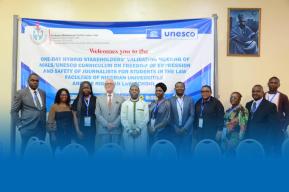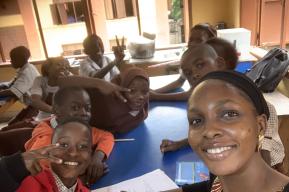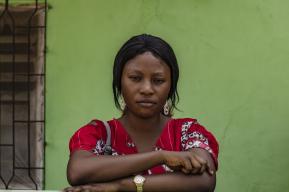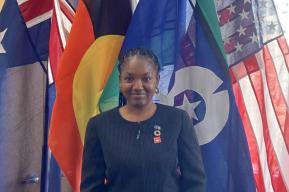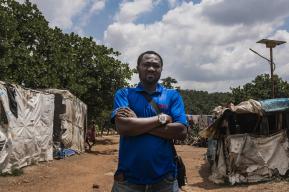Nigeria’s media scene is one of the liveliest in Africa. State TV and hundreds of radio stations have the capacity to reach tens of millions of viewers and listeners. Along with the wide spread of mobile phones and networks, millions of Nigerians are actively on the social media platforms. This has entailed challenges such as disinformation and hate speech, which UNESCO is helping to take on through media and information literacy.
Preparing young minds for a new world of information, technology, and media should be a priority for all educators. Yet, the world is still facing a grave challenge with basic literacy: 781 million illiterate adults and 262 million young people out of schools.
How can we merge the world of basic literacy with that of Media and Information Literacy (MIL)? Many educators around the world are championing this cause.
In Nigeria, one of these champions is Mr. Martin Akpan. Martin Akpan is an educator and the founder of Teen Resources Center in Nigeria. He is also a practitioner of MIL. His main work is to empower youth with the capacity of critical thinking and to provide quality information on traditional and social media platforms.
Mr. Akpan’s journey with MIL started in 2002, while working as a producer of children and educational programmes for two television stations (MITV and MCTV) in Lagos, Nigeria. In these eighteen years, he has witnessed the growth of MIL worldwide and its mainstreaming into Nigerian society.
His expertise was further enhanced through UNESCO’s MIL Massive Open Online Course (MOOC) launched in partnership with the Athabasca University, Canada. The MOOC enabled him to acquire a holistic approach to MIL and also brought him closer to UNESCO’s actions in the field of MIL.
According to Mr. Akpan, empowering people through MIL is becoming an essential prerequisite for fostering equitable access to information and knowledge and promoting free, independent and pluralistic media and information systems. “The adapted UNESCO MIL curriculum has supported my engagement with the children and the society at larger on MIL. It is a great tool to impart critical thinking and democratic discourse for the benefit of the society.”
Mr. Akpan believes that the MIL Coalition of Nigeria (MILCON) founded in 2017 with UNESCO’s support can play a vital role to address some of these challenges. UNESCO has continued to support the Coalition, in facilitating the coordination of interventions on MIL in Nigeria. MILCON promotes synergy amongst stakeholders towards advocating on national policies, integrating the MIL curriculum into schools and promoting a media and information literate society.
Acting as an MIL educator, Mr. Akpan works directly with pupils, students and teachers. He points out the difficulty in educating them about ‘critical thinking’, especially when it comes to appropriate resources for children. The MIL games and non-formal guide produced by UNESCO have played an important role in helping educators, like Mr. Akpan, to interact better with the users. In his words, “We are happy to hear that children are showing great excitement for these materials, and they discuss specific topics around the games and the genre of films in classrooms.” As one of the students expressed: “MIL is exciting. I have been watching cartoons as a kid but today I learn critical thinking through MIL games produced by UNESCO.”
To reach a larger percentage of the population of Nigeria, MIL clubs have been established in all regions of the country. This enables an increasing number of students to be creatively involved in MIL trainings. Mr. Akpan believes that MIL clubs serve as viable means and platforms for expanding civic education movement and non-formal MIL learning in primary and secondary schools.
The development and mainstreaming of MIL programmes in Nigeria could not be realized without the efforts from various organizations and individual enthusiasts like Mr. Akpan. The development in media, technology, and communication has brought significant changes, shaping individual lives and the society as a whole. Building a media and information literate society is under the shroud of collective responsibility and efforts to construct a strong bulwark of peace. “There is still a long way to go”, said Mr. Akpan.
About the Multi-Donor Programme for Freedom of Expression and Safety of Journalists (MDP)
The multi-Donor programme on freedom of expression and Safety of Journalists (MDP) serves to further strengthen UNESCO’s work at a global, regional, and national levels, by channeling funds towards emerging priorities and the most pressing needs to achieve its mandate on freedom of expression. It enables UNESCO’s communication and information Sector to address complex issues through the design and implementation of holistic medium and long-term interventions at national, regional and global levels. The clear advantage of this mechanism is that it allows UNESCO and its partners to achieve greater impact and sustainability, whilst reducing fragmentation of activities in the same field.
Protect journalists and freedom of expression, visit:
For UNESCO’s media and information literacy programme, visit:



